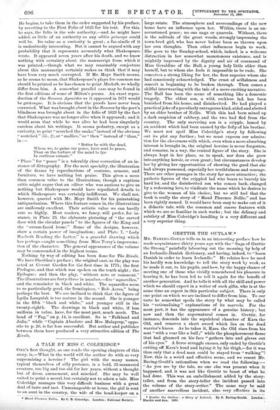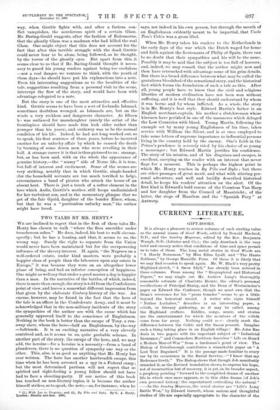GRETTIR THE OUTLAW.*
MR. BARING-GOULD tells us in an interesting preface how be made acquaintance thirty years ago with the" Saga of Grettir the Strong," painfully labouring out the meaning by help of an Icelandic-Danish dictionary, and having, indeed, to "learn Danish in order to learn Icelandic." He relates how he used his hardly won knowledge to tell the story week by week, as he made it out, to his pupils, and how, by the happy chance of meeting one of those who vividly remembered his pleasure in hearing it, he has been led to tell it again for the benefit of another generation. And he tells it with all the skill and power which we should expect in a writer of such gifts, who is at the same time an expert in this particular subject. There is only one point on which we are inclined to differ from him. To our taste he somewhat spoils the story by what may be called his " rationalising " explanations of its marvels. For the most part, it has the appearance of a genuine history ; but now and then the supernatural comes in. Grettir, for instance, descends into the sepulchral chamber of Kara the Old, and removes a short sword which lies on the dead warrior's knees. As he takes it, Kara the Old rises from his seat "with a roar like a bull ;" while the phosphorescent flame that had gleamed on his face " gathers into and glares out of his eyes." A fierce struggle ensues, only ended by Grettir's cutting off Kara's head and laying it by his thigh,—for it was thus only that a dead man could be stayed from "walking"! Now, this is a weird and effective scene, and we resent Mr. Baring-Gould's rationalism when we read the following :— "As you see by the tale, no one else was present when it happened, and it was not like Grettir to boast of what he had done. This was an embellishment added by the story- teller, and from the story-teller the incident passed into the volume of the story-writer." The same may be said of another marvellous incident, also very effective in its Grettir the Outlaw: a Story of Iceland. By B. Baring-Gould. London: Blackie and Son. 1890.
way, when Grettir fights with, and after a furious con- flict vanquishes, the murderous spirit of a certain Glam. Mr. Baring-Gould suggests, after the fashion of Euhemerns, that the ghostly Glam was a madman who had killed the real Glam. One might object that this does not account for the fact that after this terrible struggle with the dead, Grettir could never bear to be alone, being followed, as he thought, by the terror of the ghostly eyes. But apart from this, it seems clear to us that if Mr. Baring-Gould thought it neces- sary to guard his young readers against being too credulous —not a real danger, we venture to think, with the youth of these days—he should have put his explanations into a note. Even his interesting suggestions as to the localities of the tale, suggestions resulting from a personal visit to the scene, interrupt the low of the Story, and would have been with advantage relegated to a note.
But the story is one of the most attractive and effective kind. Grettir seems to have been a sort of Icelandic Ishmael, sometimes doubtless wronged, as Ishmaels are, but on the whole a very reckless and dangerous character. At fifteen 112; was outlawed for manslaughter (surely the artist of the frontispiece should have made him look elder rather than younger than his years), and outlawry was to be the normal condition of his life. Indeed, he had not long worked out, so to speak, his first sentence of three years, before he incurred another for an unlucky affair by which he caused the death by burning of some dozen men who were revelling in their hall. A strange career it is that is thus pictured to us ; strange, but, as has been said, with on the whole the appearance of genuine history,—the " seamy " side of Norse life, it is true, hut full of interest and excitement Some of the scenes are very striking, notably that in which Grettir, single-handed (for the household servants are too much terrified to help), exterminates a band of pirates who attack the house of an absent host. There is just a touch of a softer element in the love which Asdis, Grettir's mother, still keeps undiminished for her turbulent son, and in the momentary glimpse that we get of the fair Gyrid, daughter of the bonder Einer, whom, but that he was a "portionless unlucky man," the outlaw might have loved.



















































 Previous page
Previous page